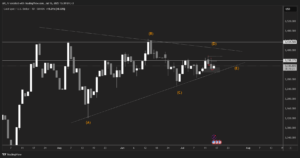Bank of America concerned
Bank of America is overly concerned that the high price inflation will pose an imminent threat to the US economy. Just last week, their chief investment strategist, Michael Hartnett, warned that ‘inflation shock’ is worsening, ‘rate shock’ is just beginning, and ‘recession shock’ is coming. Hartnett noted that inflation is “out of control,” adding: “Inflation causes recessions.“
Indeed, data from the Bureau of Labor Statistics revealed that prices in America keep creeping up; the Consumer Price Index for All Urban Consumers (CPI-U) increased 8.5 per cent for the 12 months ending March, the largest 12-month increase in 40 years. Most of the increase was due to a surge in gasoline; last month alone, gas increased by more than 18% per cent, whereas within one year, gas skyrocketed by 48%. Overall, the index reported a record year-over-year rise in prices on everything, from food (up by 10%) and apparel (up by 6.8%) to new vehicles (up by 12.5%) and transportation services (up by 7.7%).
The Federal Reserve of the USA
The Federal Reserve System is the central bank of the United States and it’s the main body to slam on the brakes to fight rising inflation when economic expansions get out of hand. Currently, markets are getting ready for the Fed to rapidly raise the interest rates so that they put a stop to prices getting even more under control. However, even though there are worries that the central bank will do too much resulting in the economy’s collapse, according to Christopher J. Waller, one of the Federal Reserve’s governors in Washington, recent economic data supports the need to raise interest rates by more than usual in May.
“The data has come in exactly to support that type of policy action if the committee decides to do so,” the governor said during an interview last week, before adding that the data may justify “possibly more in June and July.” Likewise, minutes from the central bank’s last meeting indicated that “many” officials were in favour of a large increase in the interest rates even from March if it weren’t for the uncertainty created by Russia’s military invasion of Ukraine.
Mr Waller suggested that inflation might be touching a peak after which the prices will start decreasing. “This is pretty much the peak — it’s going to start coming down,” the governor said, “We’re already seeing some oil prices retreating back.” But still, he argues that it’s essential to lift the interest rates up to, and even above, neutral to control inflation: “Right now, our main concern is getting these prices down, and we can do that without causing a recession,” he said. Ideally, the central bank would manage to constrict inflation without sinking the US economy in the process.
Nevertheless, some forecasters are concerned that the Fed’s chances of cooling off inflation without bringing recession are slim. “If you look at history, there has never been a moment when inflation was above 4% and unemployment was below 5% when we did not have a recession within the next two years,” former Treasury Secretary, Larry Summers told Bloomberg last week. The unemployment rate reached a low of 3.6% in March, the lowest since February 2020, while wage inflation is now running above 6% to the best data. Regarding the possibility of curbing inflation without triggering a recession, Summer contends “It could happen… But I don’t think it’s terribly likely.“
Disclaimer: This article is not investment advice or an investment recommendation and should not be considered as such. The information above is not an invitation to trade and it does not guarantee or predict future performance. The investor is solely responsible for the risk of their decisions. The analysis and commentary presented do not include any consideration of your personal investment objectives, financial circumstances or needs.





